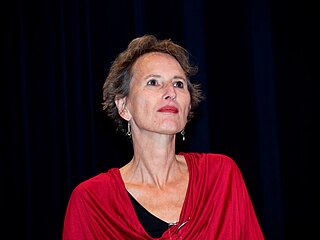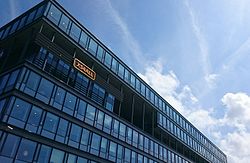This article is intended to give an overview of telecommunications in the Netherlands.

There are a number of disputes concerning the Church of Scientology's attempts to suppress material critical of Scientology and the organization on the Internet, utilizing various methods – primarily lawsuits and legal threats, as well as front organizations. In late 1994, the organization began using various legal tactics to stop distribution of unpublished documents written by L. Ron Hubbard. The organization has often been accused of barratry through the filing of SLAPP suits. The organization's response is that its litigious nature is solely to protect its copyrighted works and the unpublished status of certain documents.

Internet access is the ability of individuals and organizations to connect to the Internet using computer terminals, computers, and other devices; and to access services such as email and the World Wide Web. Internet access is sold by Internet service providers (ISPs) delivering connectivity at a wide range of data transfer rates via various networking technologies. Many organizations, including a growing number of municipal entities, also provide cost-free wireless access and landlines.
An online service provider (OSP) can, for example, be an Internet service provider, an email provider, a news provider (press), an entertainment provider, a search engine, an e-commerce site, an online banking site, a health site, an official government site, social media, a wiki, or a Usenet newsgroup.
Demon Internet was a British Internet service provider, initially an independent business, later operating as a brand of Vodafone. It was one of the UK's earliest ISPs, offering dial-up Internet access services from 1 June 1992. According to the Daily Telegraph, it "sparked a revolution by becoming the first to provide genuinely affordable access to the internet in the UK".

KPN is a Dutch landline and mobile telecommunications company. KPN originated from a government-run postal, telegraph and telephone service and is based in Rotterdam, Netherlands.
A naked DSL, also known as standalone or dry loop DSL, is a digital subscriber line (DSL) without a PSTN service — or the associated dial tone. In other words, only a standalone DSL Internet service is provided on the local loop.
The Indonesia Internet Exchange (IIX) is the national interconnection point for Internet Service Providers in Indonesia. Launched in August 1997, the IIX is operated by the Indonesian Internet Service Providers Association (APJII).
According to research done by the Organisation for Economic Co-operation and Development (OECD), the Netherlands is ranked with Switzerland in having the most broadband subscriptions per 100 inhabitants, has no bandwidth caps, and has the most homes passed in Europe in terms of connection speeds of 50 Mbit/s and higher.
The Internet is accessible to the majority of the population in Egypt, whether via smartphones, internet cafes, or home connections. Broadband Internet access via VDSL is widely available. Under the rule of Hosni Mubarak, Internet censorship and surveillance were severe, culminating in a total shutdown of the Internet in Egypt during the 2011 Revolution. Although Internet access was restored following Mubarak's order, government censorship and surveillance have increased since the 2013 coup d'état, leading the NGO Freedom House to downgrade Egypt's Internet freedom from "partly free" in 2011 to "not free" in 2015, which it has retained in subsequent reports including the most recent in 2021. The El-Sisi regime has ramped up online censorship in Egypt. The regime heavily censors online news websites, which has prompted the closure of many independent news outlets in Egypt.
DNS hijacking, DNS poisoning, or DNS redirection is the practice of subverting the resolution of Domain Name System (DNS) queries. This can be achieved by malware that overrides a computer's TCP/IP configuration to point at a rogue DNS server under the control of an attacker, or through modifying the behaviour of a trusted DNS server so that it does not comply with internet standards.

Internet in India began in 1986 and was available only to the educational and research community. General public access to the internet began on 15 August 1995. American multinational digital communications technology conglomerate Cisco estimated that India will have more than 900 million internet users by 2023.
Navini Networks was a company that developed an Internet access system based on WiMAX wireless communication standards. This access system was subsequently acquired by Cisco Systems in October, 2007.
Telecommunications in Costa Rica include radio, television, fixed and mobile telephones, and the Internet.

Karin Spaink is a journalist, writer and feminist.
Internet censorship in Ireland is a controversial issue with the introduction of a graduated response policy in 2008 followed by an effort to block certain file sharing sites starting in February 2009. Beyond these issues there are no government restrictions on access to the Internet or credible reports that the government monitored e-mail or Internet chat rooms. Individuals and groups could engage in the expression of views via the Internet, including by e-mail. Irish law provides for freedom of speech including for members of the press, and the government generally respects these rights in practice. An independent press, an effective judiciary, and a functioning democratic political system act jointly to ensure freedom of speech and of the press.
A mobile broadband modem, also known as wireless modem or cellular modem, is a type of modem that allows a personal computer or a router to receive wireless Internet access via a mobile broadband connection instead of using telephone or cable television lines. A mobile Internet user can connect using a wireless modem to a wireless Internet Service Provider (ISP) to get Internet access.

This is a list on countries where at least one internet service provider (ISP) formerly or currently censors the popular file sharing website The Pirate Bay (TPB).
On June 4, 2012, the Netherlands became the first country in Europe and the second in the world, after Chile, to enact a network neutrality law. The main net neutrality provision of this law requires that "Providers of public electronic communication networks used to provide Internet access services as well as providers of Internet access services will not hinder or slow down services or applications on the Internet".
The Church of Scientology has been active in the Netherlands since 1972, opening its first church in Amsterdam in 1974.






